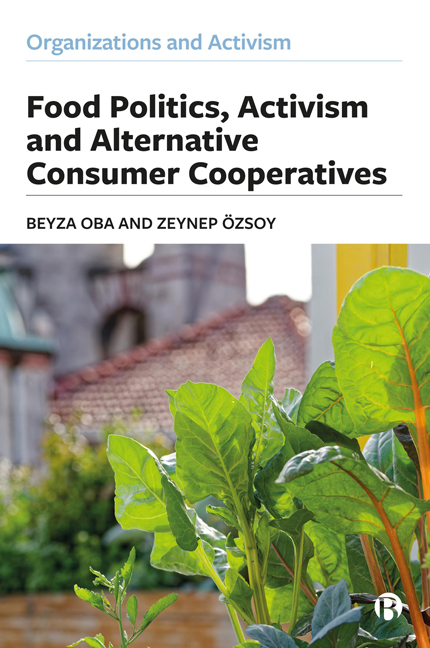Book contents
- Frontmatter
- Contents
- Series Editors’ Preface
- 1 Introduction: Experimenting with Direct Democracy
- 2 The Politics of Food: Alignment for Solidarity and Resistance
- 3 Against Neo-Liberalism and Authoritarianism: The Background to Food Politics in Turkey
- 4 The Political Economy of Consumer Cooperatives in Turkey
- 5 Alternative Consumer Cooperatives in the Making of a Public Sphere
- 6 Experimenting with an Alternative to the Capitalist Food Provisioning System
- 7 The Governance of Alternative Consumer Cooperatives
- 8 Instead of a Conclusion
- Notes
- References
- Index
Series Editors’ Preface
Published online by Cambridge University Press: 27 March 2024
- Frontmatter
- Contents
- Series Editors’ Preface
- 1 Introduction: Experimenting with Direct Democracy
- 2 The Politics of Food: Alignment for Solidarity and Resistance
- 3 Against Neo-Liberalism and Authoritarianism: The Background to Food Politics in Turkey
- 4 The Political Economy of Consumer Cooperatives in Turkey
- 5 Alternative Consumer Cooperatives in the Making of a Public Sphere
- 6 Experimenting with an Alternative to the Capitalist Food Provisioning System
- 7 The Governance of Alternative Consumer Cooperatives
- 8 Instead of a Conclusion
- Notes
- References
- Index
Summary
Organizing is politics made durable. From cooperatives to corporations, Occupy to Meta, states and NGOs, organizations shape our lives. They shape the possible futures of governance, policy making and social change, and hence are central to understanding how human beings can deal with the challenges that face us, whether that be pandemics, populism or climate change. This book series publishes work that explores how politics happen within and because of organizations and organizing. We want to explore how activism is organized and how activists change organizations. We are also interested in the forms of resistance to activism, in the ways that powerful interests contest and reframe demands for change. These are questions of huge relevance to scholars in sociology, politics, geography, management and beyond, and are becoming ever more important as demands for impact and engagement change the way that academics imagine their work. They are also important to anyone who wants to understand more about the theory and practice of organizing, not just the abstracted ideologies of capitalism taught in business schools.
Our books offer critical examinations of organizations as sites of, or targets for, activism, and we will also assume that our authors – and hopefully our readers – are themselves agents of change. Titles may focus on specific industries or fields, or they may be arranged around particular themes or challenges. Our topics might include the alternative economy; surveillance, whistleblowing and human rights; digital politics; religious groups; social movements; NGOs; feminism and anarchist organization; action research and co-production; activism and the neoliberal university, and any other subjects that are relevant and topical.
Organizations and Activism is also a multidisciplinary series. Contributions from all and any relevant academic fields will be welcomed. The series is international in outlook, and proposals from outside the English-speaking global north are particularly welcome.
There could hardly be a more essential subject to human life than the focus for the fifth book in our series: food. We buy it, cook it, consume it every day. It is essential to survive, and also plays a pivotal role in our overall health and wellbeing. Yet food is more than this. Food is not merely sustenance; it is a source of pleasure, cultural identity and social connection. From birthdays to weddings, holidays to festivals, food takes centre stage in commemorating these important moments in our lives. Food matters.
- Type
- Chapter
- Information
- Food Politics, Activism and Alternative Consumer Cooperatives , pp. vi - viiiPublisher: Bristol University PressPrint publication year: 2023

